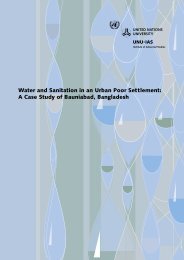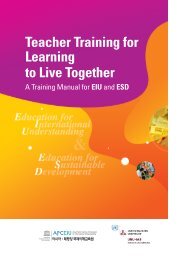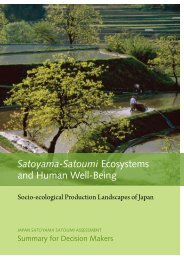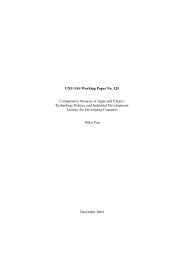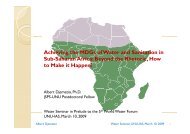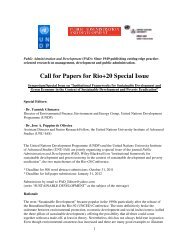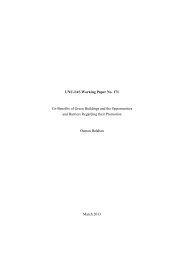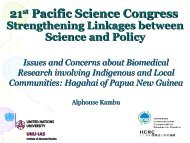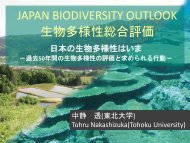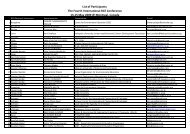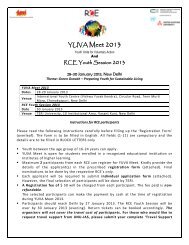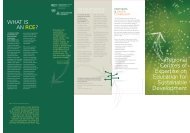Bioprospecting in the Arctic - UNU-IAS - United Nations University
Bioprospecting in the Arctic - UNU-IAS - United Nations University
Bioprospecting in the Arctic - UNU-IAS - United Nations University
Create successful ePaper yourself
Turn your PDF publications into a flip-book with our unique Google optimized e-Paper software.
esearch applications category (34%) and Enzymes with<br />
<strong>in</strong>dustrial applications category (3%). While health related<br />
patent/patent applications <strong>in</strong> <strong>the</strong> categories of Medic<strong>in</strong>es<br />
and pharmaceuticals (23%) and Nutraceuticals, dietary<br />
supplements and o<strong>the</strong>r health products (10%) are of less<br />
significance than data on companies R&D and product<br />
focus above would suggest.<br />
There are a number of possible explanations for this.<br />
Firstly <strong>the</strong> Nutraceuticals, dietary supplements and o<strong>the</strong>r<br />
health products category may <strong>in</strong>clude products that<br />
USA<br />
66%<br />
Figure 2: Patents and patent applications by jurisdiction<br />
Norway<br />
6%<br />
A fur<strong>the</strong>r explanation may lie <strong>in</strong> <strong>the</strong> cost associated with<br />
fil<strong>in</strong>g and ma<strong>in</strong>ta<strong>in</strong><strong>in</strong>g a patent. The World Intellectual<br />
Property Organisation notes that <strong>the</strong>se costs fall <strong>in</strong>to<br />
four broad categories:<br />
“Firstly, <strong>the</strong> costs relat<strong>in</strong>g to <strong>the</strong> application<br />
fees and o<strong>the</strong>r prosecution fees paid to <strong>the</strong><br />
national or regional patent offices. Such costs<br />
may vary widely from country to country<br />
…Secondly, <strong>the</strong> costs relat<strong>in</strong>g to patent<br />
attorneys/agents who assist <strong>in</strong> draft<strong>in</strong>g <strong>the</strong><br />
patent application. While <strong>the</strong> use of a patent<br />
attorney/agent is usually optional (unless <strong>the</strong><br />
applicant is not resid<strong>in</strong>g <strong>in</strong> <strong>the</strong> country and<br />
<strong>the</strong> law requires that he [sic] be represented<br />
by an attorney or agent admitted <strong>in</strong> <strong>the</strong><br />
country), it is generally advisable to seek legal<br />
advice when draft<strong>in</strong>g a patent document.<br />
Patent attorney fees will vary significantly<br />
from country to country. Thirdly, costs of<br />
translation. Such costs are only relevant when<br />
seek<strong>in</strong>g IP protection <strong>in</strong> foreign countries<br />
whose official language is different from <strong>the</strong><br />
language <strong>in</strong> which <strong>the</strong> application has been<br />
prepared and may prove to be high, especially<br />
for highly technical patent applications.<br />
Fourthly, <strong>the</strong> cost of ma<strong>in</strong>ta<strong>in</strong><strong>in</strong>g applications<br />
and patents through payments to <strong>the</strong> patent<br />
office. Such fees are usually paid at regular<br />
<strong>in</strong>tervals (e.g. every year or once every five<br />
years) <strong>in</strong> order to ma<strong>in</strong>ta<strong>in</strong> <strong>the</strong> application or<br />
<strong>the</strong> patent. Protect<strong>in</strong>g patents for <strong>the</strong> entire<br />
term of protection (<strong>in</strong> general, 20 years) <strong>in</strong><br />
cannot be <strong>the</strong> subject of a patent because <strong>the</strong>y do not<br />
meet <strong>the</strong> criteria of <strong>in</strong>ventiveness or novelty required<br />
for a patent to be granted. For example, <strong>in</strong> <strong>the</strong> case of<br />
products based on Omega 3 fatty acids such as fish<br />
oils <strong>the</strong> purported health benefits of fish oils have been<br />
known for generations. Given <strong>the</strong> significant body of<br />
prior knowledge <strong>in</strong> this area patents are less likely to<br />
be granted. This may not always be <strong>the</strong> case and new<br />
patentable <strong>in</strong>ventions may still be possible even with a<br />
significant body of exist<strong>in</strong>g knowledge, but this could be<br />
a partial explanation.<br />
Germany<br />
3% Iceland<br />
3%<br />
Russia<br />
10%<br />
F<strong>in</strong>land<br />
6%<br />
Japan<br />
6%<br />
various countries may prove an expensive<br />
undertak<strong>in</strong>g, also tak<strong>in</strong>g <strong>in</strong>to account that<br />
annual ma<strong>in</strong>tenance fees are usually <strong>in</strong>creas<strong>in</strong>g<br />
<strong>the</strong> longer <strong>the</strong> protection is ma<strong>in</strong>ta<strong>in</strong>ed. Such<br />
costs would have to be compared to <strong>the</strong><br />
wide range of benefits that could derive <strong>the</strong>re<br />
from.” 145<br />
Thus although fees vary from jurisdiction to jurisdiction,<br />
for smaller companies <strong>the</strong> benefits of patent<strong>in</strong>g each<br />
and every new <strong>in</strong>vention developed <strong>in</strong> <strong>the</strong> course of<br />
R&D may not justify <strong>the</strong> cost. Many of <strong>the</strong> companies<br />
identified <strong>in</strong> <strong>the</strong> Nutraceuticals, dietary supplements and<br />
o<strong>the</strong>r health products category <strong>in</strong> this study are small<br />
companies so this may <strong>in</strong> part offer an explanation<br />
for <strong>the</strong> absence of patents <strong>in</strong> this field. This is also<br />
consistent with anecdotal comments made by several<br />
scientists and one of <strong>the</strong> company representatives<br />
<strong>in</strong>terviewed for <strong>the</strong> purposes of this research who<br />
<strong>in</strong>dicated that <strong>the</strong> cost of patent<strong>in</strong>g often means<br />
patent<strong>in</strong>g of <strong>in</strong>ventions is not a high priority.<br />
Thus while as a general rule patents <strong>in</strong> certa<strong>in</strong><br />
circumstances may be viewed as a fair proxy of <strong>the</strong> level<br />
of commercial <strong>in</strong>terest <strong>in</strong> relation to particular fields of<br />
biotechnology 146 , data on patents should be approached<br />
with caution as some companies simply do not bo<strong>the</strong>r<br />
with <strong>the</strong> patent system as <strong>the</strong>y view patent<strong>in</strong>g as an<br />
expensive process offer<strong>in</strong>g little return on <strong>in</strong>vestment.<br />
Commercial <strong>in</strong>terest <strong>in</strong> <strong>Arctic</strong> genetic resources may<br />
<strong>the</strong>refore be much larger than analysis of patent data<br />
suggests.<br />
23



